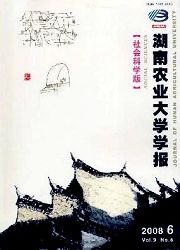

 中文摘要:
中文摘要:
基于代际差异视角和724份问卷调查数据,从经济、政治、文化和社会四个维度测评了农民工的城市融入程度并分析其影响因素。结果表明,新生代农民工的城市融入综合得分较老生代农民工高出0.157766。文化程度、务工年数对农民工融入城市有正向作用,年龄、婚姻、兄弟姐妹数等变量影响不显著。是否有亲属在政府部门、参加同乡会对新生代农民工影响显著。新生代农民工的城市融入度因区域和企业所有制不同而存在明显差异,老生代农民工的城市融入则只受文化程度和务工年数的影响。
 英文摘要:
英文摘要:
This paper made an analysis on urban integration and its influencing factors of migrant workers from four dimensions of economics, politics, culture and society based on the perspective of intergenerational differences and 724 survey data. The results showed that the level of urban integration of the new generation migrant workers was higher than that of the old generation migrant workers by 0.157766. Educational degree and working years had positive effect on migrant workers' urban integration. The effects of age, marriage, sibling number were not significant. Whether being a relative of some government officials or having participated in an association of fellow provincials or townsmen would significantly influence the urban integration of the new generation migrant workers. There were significant regional differences and enterprise differences among the level of urban integration of the new generation migrant workers. While the urban integration of the old generation migrant workers was merely affected by educational degree and working year.
 同期刊论文项目
同期刊论文项目
 同项目期刊论文
同项目期刊论文
 期刊信息
期刊信息
